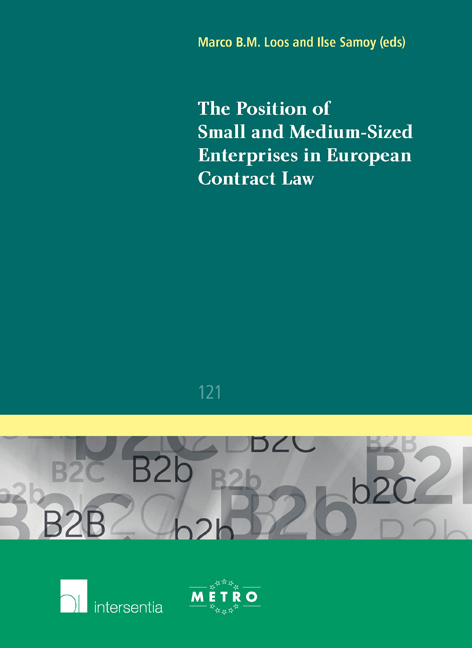Book contents
- Frontmatter
- Contents
- The Position of Small and Medium-Sized Enterprises in European Contract Law: An Introduction
- Chapter 1 SMEs in the Common European Sales Law
- Chapter 2 Can the Common European Sales Law do without the definition of an SME?
- Chapter 3 A Consumer Law for Professionals: Radical Innovation or Consolidation of National Practices?
- Chapter 4 The CESL and its Unfair Terms Protection for SMEs
- Chapter 5 Unfair Terms in Contracts Between Businesses A Comparative Overview in Light of the Common European Sales Law
- Chapter 6 Harmonisation of Rules on Business-to-Business Marketing Practices: A Critical Analysis of the MCAD Report
- Ius Commune Europaeum
Chapter 5 - Unfair Terms in Contracts Between Businesses A Comparative Overview in Light of the Common European Sales Law
Published online by Cambridge University Press: 27 November 2017
- Frontmatter
- Contents
- The Position of Small and Medium-Sized Enterprises in European Contract Law: An Introduction
- Chapter 1 SMEs in the Common European Sales Law
- Chapter 2 Can the Common European Sales Law do without the definition of an SME?
- Chapter 3 A Consumer Law for Professionals: Radical Innovation or Consolidation of National Practices?
- Chapter 4 The CESL and its Unfair Terms Protection for SMEs
- Chapter 5 Unfair Terms in Contracts Between Businesses A Comparative Overview in Light of the Common European Sales Law
- Chapter 6 Harmonisation of Rules on Business-to-Business Marketing Practices: A Critical Analysis of the MCAD Report
- Ius Commune Europaeum
Summary
Introduction
'On fête àpeine le centenaire du Code civil, etpourtant, dans bien des cas, il apparaît déjà comme une législation désorientée au milieu de générations nouvelles, incapable de comprendre leursgoûts ou d'interpréter leurs aspirations. C'est que, depuis un siècle, bien des révolutions se sontproduites, bien des évolutions aussi: économiques, politiques ou sociales.'
This quote comes from the introduction of a French PhD thesis published in 1905. It reveals that already at the start of the previous century, at least some scholars considered the Code civil to be outdated. The author continues by giving examples of these inventions: the steam engine, electricity, trains, etc. It goes without saying that our society has evolved at even a much faster pace since then. So which was true in 1905 is a fortiori true in 2012. The contention that (at least some parts of) the French and Belgian Code civil are outdated, amounts to kicking in an open door.
One striking example of the way contracting has evolved is the use of standard terms. Standard terms are sets of contract terms which are drafted in advance, independently of any specific contractual negotiation and to be used in multiple contracts. The codifications of the 19th century, however, envisage a contract which is concluded between two parties after individual negotiations. Together with the industrial revolution and the corresponding development of a mass society came the mass use of standard contracts and standard contract terms. Standard terms are therefore sometimes called a child of the 19th century, but that is not entirely correct. While it is true that at that time the mass application of standard terms began, its origins lie much further back in history. Already in the ancient world, standard terms appeared in rental agreements. In the Middle Ages, pilgrims for the Holy Land often took a boat from Venice. For some time, they could only choose between two shipping companies that used standard terms which were drafted for their sole benefit. To make matters worse, those companies executed their remaining duties poorly. The Mediterranean legislatures of Venice and Genoa therefore intervened with mandatory law.
- Type
- Chapter
- Information
- Publisher: IntersentiaPrint publication year: 2014



